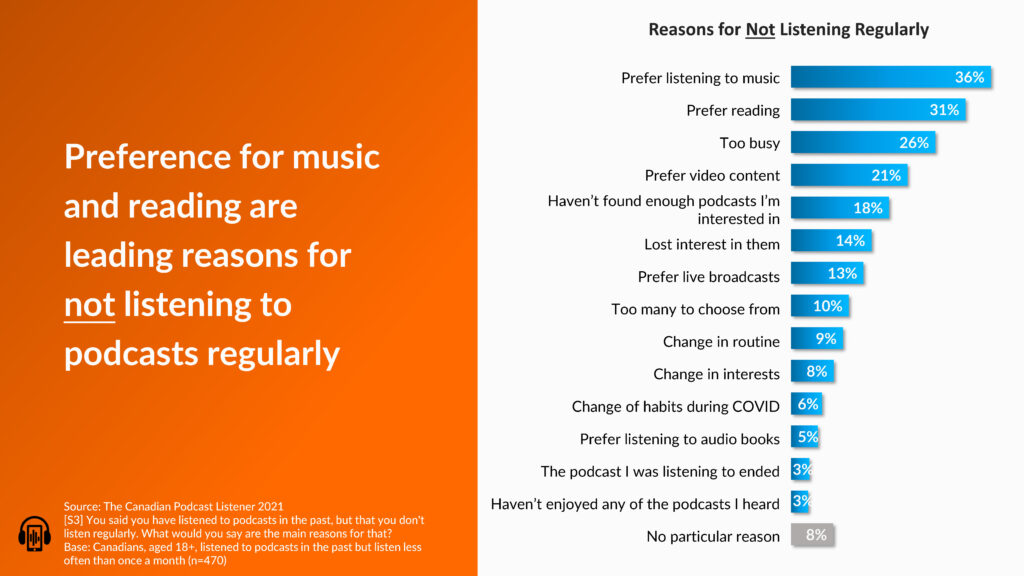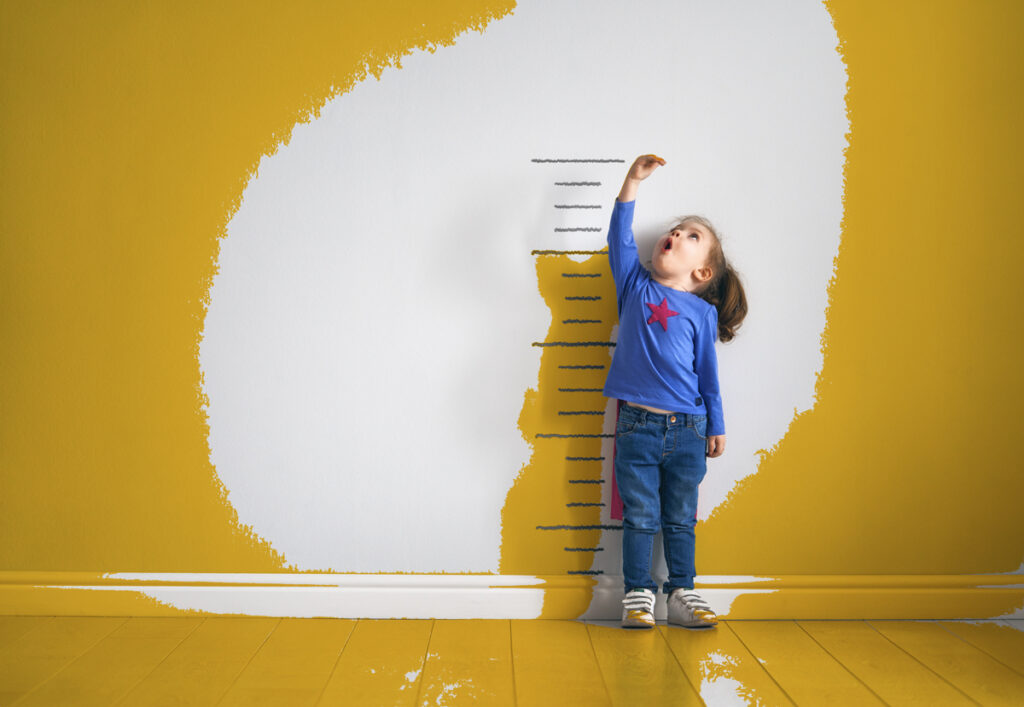We’ve been struck with a paradox ever since we started The Canadian Podcast Listener study back in 2017.
Every year, we ask the monthly podcast listeners in our study when they started listening to podcasts and, typically, somewhere between 35 and 40 percent say they started their podcast journey in just the past year.
That suggests spectacular growth and, sure enough, podcast listening in Canada keeps climbing year after year, much as it does elsewhere. But not by 35 to 40% a year, more like 1 to 3% a year.
How is that possible? Podcasters need an explanation for this contradiction.
Why Would Someone Reject a Podcast?
Our read is that there are a lot of people who are on the fringes of being podcast listeners. Nearly 20% of all Canadian adults say they tried podcasts in the past but don’t listen regularly, not even once a month. We call them ‘trial rejectors.’ They may come in and out of podcasts, but they haven’t made it a habit.
We decided to take a closer look at these trial rejectors—to see what podcast industry and individual podcasters could do to bring these listeners back for more.
Not enough time for podcasts
We all know how hard it is to do any brainwork when you listen to podcasts, especially narrative vs. conversational podcasts. You have to either set aside time to listen, or make maximum use of those moments when your eyes are busy but your mind is free.
So it is that:
- 36% of trial rejectors say they prefer listening to music (much easier for multi-tasking)
- 31% say they prefer reading (more time efficient; you can pack more learning and/or entertainment into a half hour of reading); and 26% say they’re just too darn busy.

Content gaps
Even with millions of podcasts now available, a lot of these trial rejectors didn’t find that one podcast that was exactly right for them:
- 18% say they haven’t found enough podcasts that interest them;
- 14% lost interest in podcasts; and
- 3% say they haven’t enjoyed any of the podcasts they heard.
Sure, some of this points to podcasting’s age-old discovery problem. But the issue runs deeper. The podcasts they found didn’t speak to them personally. As a result, these listeners weren’t sufficiently invested in podcasts to make the effort for discovery.
The picture gets clearer when you dive into that 35-40% of monthly podcast listeners who say they started listening to podcasts in the past year. From The Canadian Podcast Listener 2021:
- These new listeners are less likely than others to have listened to a podcast in the past week (55% vs. 68%)
- Among those who listen weekly, they are less likely than longtime listeners to listen to as many episodes a week (6.7 vs. 10.3 for tenured listeners of 5+ years)
- Finally, compared to those who have been listening to podcasts for 2+ years, they are:
- less likely to use Apple Podcasts as their primary podcast platform (13% vs. 21%)
- more likely to use Spotify as their primary podcast platform (28% vs. 25%); and
- even more likely to use YouTube as their primary podcast platform (33% vs. 24%)
Correctly Defining the Problem
Every good solution starts with identifying the problem.
Why don’t the reasons given by podcasting trial rejectors apply to other forms of media? Well, they did, and they still do! It’s just that those other forms of media have come to terms with these challenges.
Problems that movies, music, books and television series have overcome are now being faced by podcasters. They are:
- attention competition
- habit competition; and
- technical limitations.
Attention/habit competition
Reed Hastings of Netflix spelled out the most important competition facing all media:
“Sometimes employees at Netflix think, ‘Oh my god, we’re competing with FX, HBO, or Amazon… “but think about if you didn’t watch Netflix last night: What did you do? There’s such a broad range of things that you did to relax and unwind, hang out, and connect–and we compete with all of that…. You get a show or a movie you’re really dying to watch, and you end up staying up late at night, so we actually compete with sleep.”
In the context of podcasting platforms, apps like YouTube and Spotify have established distinct audiences over time. And while these platforms make an accessible gateway to podcast listening in general, they also bring a lot of competition. Podcasts must compete with video essays, movies, and music, because YouTube and Spotify are not platforms dedicated to podcasting in the same way that Apple Podcasts is. Spotify is a broad-based audio platform while YouTube is a ‘one stop’ entertainment and information destination.
The solution is…
Be Amazing! Help Your Audience See Themselves as Podcast Listeners
Habits are (in some sense) a precursor to identity. And when you compete to become someone’s habit, you are essentially in competition with the other habits that inform their identity.
Netflix overcame its problem of attention by making itself so desirable that its users want to be the kind of people who watch Netflix. That’s why Netflix n’ chill is much more than a meme; it’s a cultural embrace. And just like Netflix, YouTube and Spotify evolved to being more than just a ‘platform’; they became a place to go.
Podcasters and industry professionals are engaged in a project to build a similar digital landscape: a place where you go because you want to be the sort of person who finds incredible and transformative experiences through the act of listening. And to do that, individual podcasters must take on the challenge of delivering such a unique and compelling listening experience that your audience wants to identify as being listeners of your podcast.
Because once they’ve become that kind of person, they will automatically find time to listen.
Technical Hurdles
Yes, even in 2022, most potential podcast listeners are not tech aware enough to make accessing podcasts convenient for themselves. For example…
- far too many people don’t know their phone comes with a default podcasting app
- others don’t know how to evaluate the pros and cons of different podcasting platforms; and
- sometimes data-saving settings on a phone can prevent a podcasting app from downloading the next episode.
And the solution to this is…
Be Convenient! Make it EASY For Your Audience to Become Podcast Listeners
Media consumers today are accustomed to getting their content with minimal friction and decision making. It’s annoying (and time-consuming) that the current infrastructure for podcasting doesn’t make that easy, but it’s an uphill battle every podcast can help fight right now.
As a quick example, consider making a practice of including reminders at the end of podcast episodes that tell your listeners how to share your podcast and optimize it for the platform they’re sharing on.
Light listeners present the podcast industry and the podcaster with an important challenge. The industry needs to inspire, educate, and otherwise pave the way to making podcasting a habit. And, as a podcaster, you need to deliver the unique listening experience that makes your podcast a treasured way station in your listeners’ complicated and busy life.
***
The Canadian Podcast Listener 2021 is co-published by Signal Hill Insights and Jeff Ulster, with support from The Podcast Exchange (TPX). Results are based on online surveys using a market representative sample of more than 4,500 Canadian adults from Maru Voice Canada.
